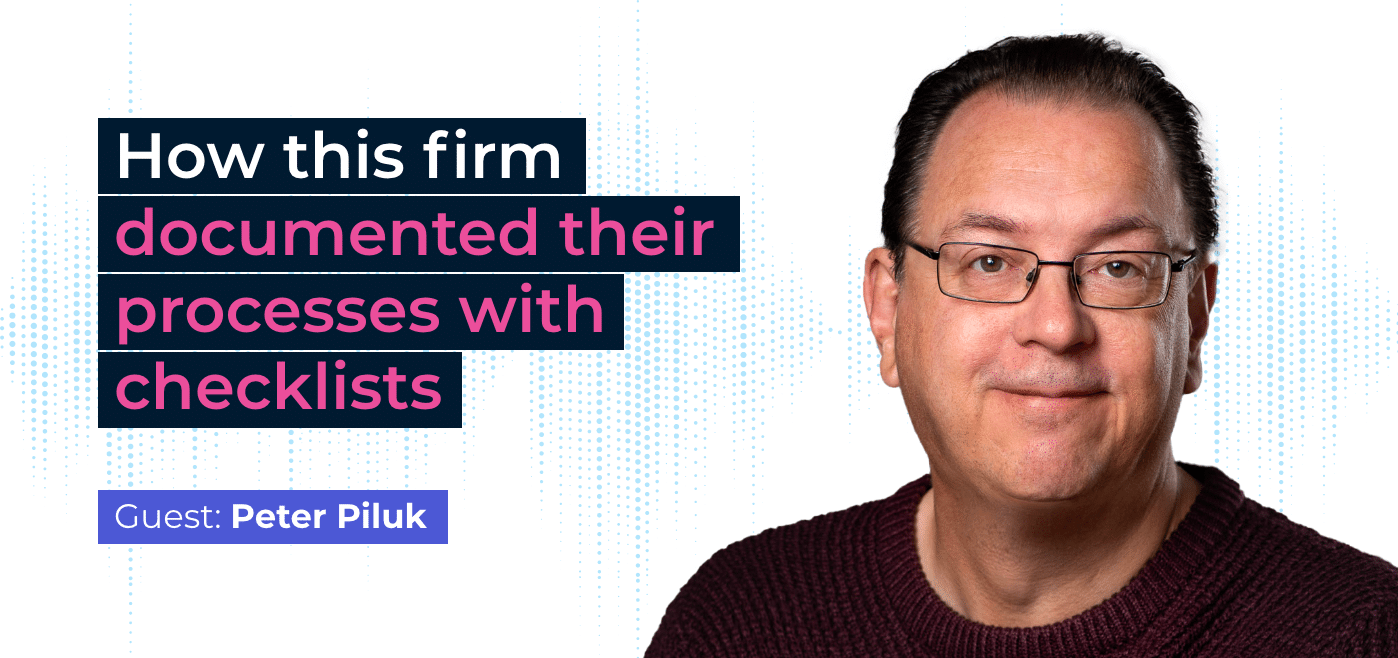S01 E12: How this firm documented their processes with checklists
Guest: Bobbie Witt

Podcasts » S01 E12: How this firm documented their processes with checklists
Meet Peter, the owner of Pathway. He owns an accounting firm with 2 team members and over 300 clients.
In this episode, we talk about documenting your processes with checklists! You will learn why your need to document your processes, when to do it and how to do it.
Show Notes:
Host:
Welcome back to another episode of The Accounting Firm podcast where we bring you valuable discussions and insights from accounting firm owners. I’m your host, Shahram Zarshenas and in today’s episode, we have a special guest joining us to share his experience on how his firm documents their processes with checklists. Our guest today is Peter, the founder of Pathway. Peter, welcome to the show!
Guest:
Thank you, Shahram, it’s great to be here.
Host:
Peter, your firm has gained a reputation for its efficient processes,could you share with our listeners how you started implementing this approach?
Guest:
Absolutely. When we started our firm, we realized the importance of having clear and standardized processes in place. We wanted to ensure that every task, no matter how routine, was executed flawlessly. Checklists emerged as the perfect tool for achieving this goal. They provide a step-by-step guide that helps our team members consistently follow best practices.
Host:
That’s fascinating. How did you go about creating these checklists?
Guest:
It was a collaborative effort. We involved team members from different departments to gather insights and create comprehensive checklists for each process. We paid attention to every detail, documenting not only the main steps but also any potential variations or exceptions that might occur. This ensured that our checklists were thorough and adaptable to different scenarios.
Host:
That sounds like a meticulous process. How do you ensure that the checklists are up to date and relevant?
Guest:
Good question. Processes evolve over time, so it’s crucial to regularly review and update our checklists. We have a designated team responsible for maintaining the checklists, and they regularly communicate with team members to gather feedback and identify areas for improvement. This constant collaboration and feedback loop help us keep our checklists accurate and up to date.
Host:
Can you share some specific examples of how these checklists have improved your firm’s operations?
Guest:
One area where checklists have made a significant impact is in client onboarding. With our detailed onboarding checklist, we ensure that all necessary documents are collected, deadlines are met, and our clients receive a smooth and consistent experience. The checklist serves as a roadmap, reducing the chance of missing any crucial steps.
Host:
It’s clear that checklists have played a vital role in your firm’s success. Have you faced any challenges during the implementation of this approach?
Guest:
Yes, there were challenges, especially when it came to the adoption of checklists by our team members. Initially, some team members viewed checklists as unnecessary or restrictive. However, we addressed this by emphasizing the benefits of consistent processes and providing proper training and support. Over time, they began to see the value and embraced the checklist approach.
Host:
That’s an important point. Change management can be a significant hurdle. What advice would you give to other accounting firms looking to implement checklists in their processes?
Guest:
My advice would be to start small. Identify a specific process where checklists can make an immediate impact and pilot the approach with a dedicated team. Gather feedback, make adjustments, and gradually expand the use of checklists across different processes. It’s essential to involve your team members from the beginning and communicate the benefits clearly.
Host:
Thank you.




